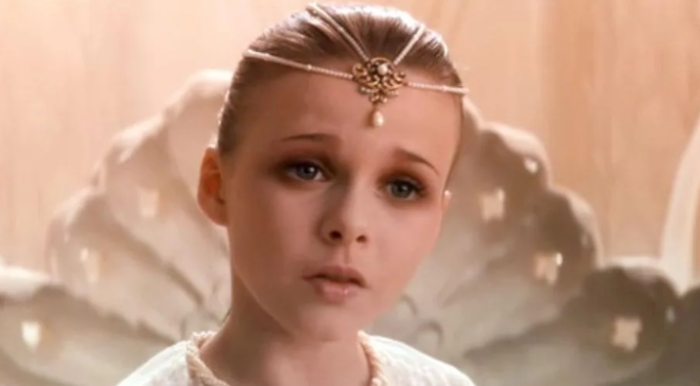The 80s were big magic.
I’m a millennial (xennial to be exact—not that there are exact ways to calculate such things). The point is: I’m 40, and like other 40-somethings, I grew up in The Land Before Time. Before the internet and cellphones.
But like many 30-somethings, I grew up with an overblown sense of my divine purpose on Earth, which I somewhat trace back to the fantasy crack that was funneled into our squishy little 80s brains and bloodshot eyes via problematic cartoons and live-action movies that are now harvested for nostalgia via binge-worthy streaming. I love these shows.
My favorite shows were about:
>> A girl who rode a horse on a rainbow to save Rainbow Land (which as far as I knew was Earth) by scattering multicolored stars;
>> A team of cute ass bears who had radioactive love tummies who saved the world (Care-A-Lot) with non-consensual moralization
And movies about:
>> The one-and-only unicorn in the entire world being hunted by a fiery bull and helped by a wizard;
>> A boy on a quest to help the one-and-only childlike Empress in the whole world to save the said world;
>> A spicy mystical remix of “The Wizard Of Oz,” replete with talking pumpkins and freaky Claymation I-don’t-know-what-the-hell and another quest: this one for a dark crystal that does all that magic;
>> Tom Cruise;
>> Unicorns;
>> David Bowie dancing with Goblins and his big ‘ol horn;
>> She Ra and Fantasia—nope, wrong universe. She Ra and… Etheria.
Now don’t get me wrong: I’m glad I had an 80s childhood.
But I’m personally fed up with seeing cadres of millennials and xennials practicing highly selective denial and presenting it as spirituality or spiritualism or mysticism (or does anyone know at this point?).
I know sci-fi has always existed and I hope it always will exist. And I think of astrology as a tool of occasional introspection from a Jungian psychoanalytical perspective that has inherent value, and from a perspective of physics, energy work possibly makes sense. All of these things can function with psychology in a way similar to complementary medicine.
Complimentary meaning: not as a substitute for the real deal.
Spirituality is subjective and I’m not here to knock anyone’s personal path, be it with a singular God or a mash-up of all of the things, as long as people are respecting the origins of their practices and not casually appropriating them to fit into their superficial fantasies.
But the definition of fantasy is as follows: “the faculty or activity of imagining things, especially things that are impossible or improbable.”
If we’re splitting hairs we could apply that to any spiritual practice—daily devotions and coffee; honoring our personal history with sage, if Indigenous, or runes, if Celtic; chanting; praying; or yoga-ing—but it’s not the practice that I find highly suspect. I’m here for it and I even do some of those things on the regular.
What I find unnecessary, if not toxic, are the grandiose delusions that the narratives a lot of new new age practitioners (or is it presenters?) are creating around their “spirituality.”
The situational ethics, the permeable reality, the lack of a fixed deity (other than the self) that religions have, the pragmatic rejection of any deity that atheists have, and the absence of an actual purpose other than to “feel good” or “better than just typically uncomfortable” fly in the face of everything spirituality has ever universally taught us.
The popular narrative goes something like this:
“I always knew I was special, magical, different, had some kind of superpowers since I was a child. Now I’m receiving recognition and affirmation online so it must be true. I’m a Goddess/Healer/Witch/Mystic/Magi/Sorcerer/Unicorn/Medium, and everything I saw on TV that fueled my escapist addictions in the face of the gloomy alternative of adulting.”
Here’s the thing: we believed a lot of things when we were kids.
We believed in a pot-bellied elderly man who gave us free presents on Christmas for no reason or the idea that our teeth were worth money on the black market.
I believed my dad would show up when he said he would, even though history taught me that he’d probably ghost me.
The thing about growing up is we become more disillusioned, and it hurts. But reality is the only plane on which we can build solid, stable, balanced lives.
And we need a reality where we don’t see ourselves as inherently superior to our fellow humans or follow our god/godess complexes into believing that we can change the outcome of toxic relationships or alter the fabric of existence with smoke and mirrors.
It’s this kind of magical thinking that sounds more like an 80s cartoon than a legitimate and beneficial spiritual discipline.
While some could argue that all religion is escapism, and I wouldn’t argue, I would point out that many provide productive belief systems and practical tools to their members.
Maybe the Bible is no more than one big, archaic Rainbow Bright book or the original fairy tale template, but the thing about the Christian religions is they do put a (I suspect small) percentage of their money where their narrative is.
It’s not just about hiring more psychics to tell people what they want to hear or adding to their own crystal collections. I’ve yet to see any hospitals or homeless shelters named after any self-appointed new age deity: The Unicorn Union Mission or The Chakra Hospital for those Who Think Cancer can be Cured by Alignment and Non-Professionals.
And thank God for that.
I know what it’s like to have patriarchal religions twist and abuse my selflessness and loving humility, but that doesn’t mean I’m going to abandon the concepts entirely. Not based on external moralism, but rather on personal reflection and choice.
The universal code of all branches of spirituality typically boils down to love, humility, and selflessness, which seem to be completely inverted among New Agers today.
The New Age theory is that by healing ourselves we heal the world. And while it is true that we can’t help anyone else until we “put on our own oxygen mask” and “clean up our own backyard” and all that, it’s been twisted into “By only healing myself, by doing only what’s fun and feels good, I’m the chosen one who creates intergenerational, international ripple effects because I’m so innately magical that the ephemeral, universal powers that have no authority over me but are here to serve my bidding appointed me as such.”
This is not spirituality. This is fantasy.
I remember how soothing it was in the 80s to identify with beautiful, magical, and powerful characters when I was in fact an insecure, ordinary, neglected, and powerless child.
Those narratives were safe spaces and provided an escape hatch from poverty and trauma and also structured the world in a way that made sense, which teachers and parents in those days had no possibility of doing.
Televisions in every home were a relatively new convenience.
Children were a new demographic for marketing experts to target.
Divorce rates were high and we were left to our own devices, cracked out like little zombies in front of epic battles between good and evil, bookended by catchy jingles and toy promotions in one long commercial.
I ate my “magically delicious” cereal and drank the actual Kool-Aid.
And that is not particularly healthy but it is appropriate for a five, six, seven, or 10-year-old.
But I’m not a kid anymore. I’m a parent, a friend, a lover, and a member of society.
Whether I choose to practice some form of spirituality and whatever I choose to call it, be it Christianity or Wicca or just mindful living, I need it to be practical and helpful, humble and pragmatic. I need it to serve as a tool to come to terms with the challenges of real life.
Not to escape from it.
~
Bonus: a little nostalgia from “The Neverending Story”
~
Please consider Boosting our authors’ articles in their first week to help them win Elephant’s Ecosystem so they can get paid and write more.
~


 Share on bsky
Share on bsky





Read 36 comments and reply